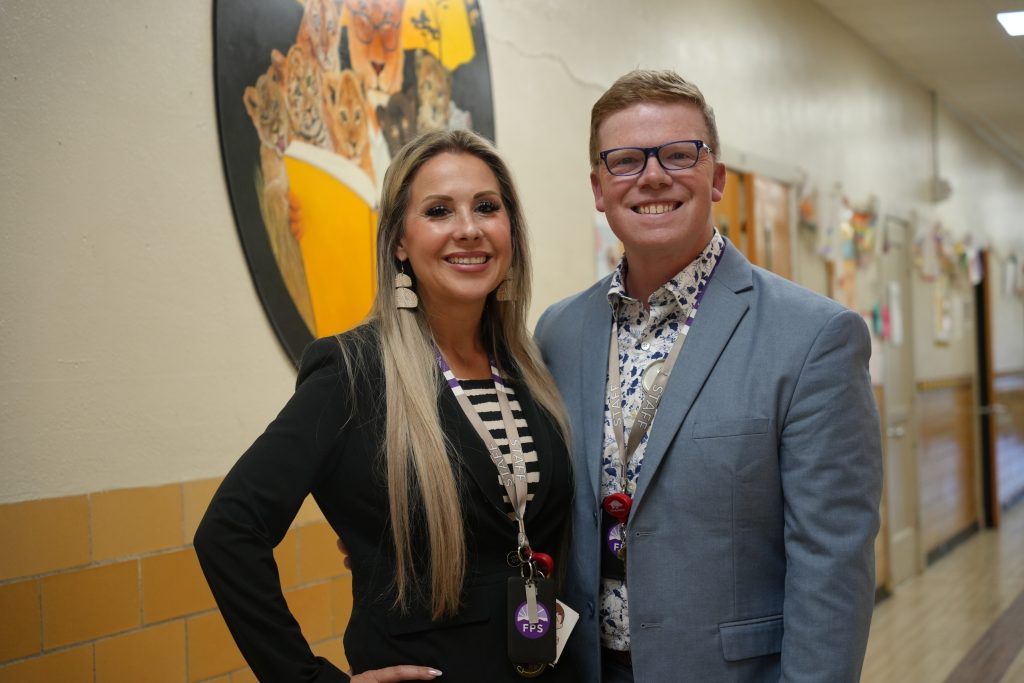Principal Christie Cremo has reduced chronic absenteeism by more than 20% at Leverett Elementary with simple solutions and culture change.
Christie Cremo gets it. As principal of Leverett Elementary School in Fayetteville, she understands that to make change in today’s educational environment, you have to be tenacious and creative.
Her staff love that tenacity. “It was a breath of fresh air when she arrived,” said assistant principal Robert Fitzgerald. “She is a scrapper and resourceful. She gets our staff and students what they need and doesn’t settle. Absenteeism was the first thing she attacked.”

Cremo has reduced chronic absenteeism by more than 20% since arriving in 2022. “Before I arrived, attendance was not a priority,” she said. “But we have steadily built a culture for our students, staff and parents to help understand how important it is to attend school regularly. Some educators have told me ‘You can’t do anything about absenteeism,’ but that simply isn’t true, and we’ve proven it through data and being consistent.”
Chronically absent is defined by a student missing 10% or more of the school year, or 17.5 days or more. “After those 17+ days is typically when social services is called. Which is often the first time families are notified that there is even a problem,” said Cremo. “So we strive to stay ahead of it. Kids know when you give up on them, and they know when you care. We work hard to show how much we care for the student and their family, and we do it by starting at the beginning of the year and getting ahead of it before it can become a problem.”
The solutions are simple, but there are several levels of intervention. Cremo and her team meet every Monday to review who was absent the week prior. Once a student accumulates three unexcused absences, they begin to collect data and document interventions. When students reach five unexcused absences or 10 total absences (excused or unexcused), a meeting with the parents is scheduled and a plan is developed.
“We also intervene earlier than that for students who have a history of chronic absenteeism,” said Cremo. “The meeting with parents is so important. We aren’t trying to reprimand them; we are trying to learn and support the family to help their child attend school regularly.
“Often, there are valid reasons that students miss class, so we work with the parents to create solutions. We create performance goals together and if they aren’t met, we do a follow up meeting. When parents realize that we just want to help, it opens up the relationship and builds trust.”
Reasons for absenteeism vary — some students do not have reliable transportation, so Cremo works with the bus drivers to accommodate their pickup. “Some students have therapeutic or medical needs on a weekly basis, but the school nurse or staff may be capable of providing those treatments here. Like asthma treatments, we can do that,” she said. “Sometimes, parents just don’t fully understand that when a child misses class, the hours of lost instruction add up, ultimately affecting grades and overall performance.
“We have woven the importance of attendance into everything,” Cremo continues. “We use a ‘Strive for Five’ slogan to encourage students to miss class fewer than five days for the whole year. Morning announcements are used to recognize the percentage of students present the week before, with the goal to have 95% of students in each grade present every day. Each quarter, we have an attendance party for all students who have maintained five or fewer absences. We start small with incentives and they gradually get bigger.”
Jasaiah, a second grader who started kindergarten as extremely shy, now helps with morning announcements over the intercom, even doing his own rap to talk about not missing school. He became much more engaged and vocal at school by being given an important job. “I only have one absence so far this year,” he said. When asked why “striving for five” is so important, Jasaiah said, “For you to learn! Because if you don’t learn or can’t read, you really can’t do anything.”
In one of the main hallways at Leverett, a giant bulletin board shows the classroom attendance rates by percentage. Three years ago, most classes had 70-80% attendance, but now all classes are at 90% and above. “Students see these numbers, and it encourages them. They understand this.” she said. “Recognizing it publicly is part of the culture shift.”
Cremo isn’t leading from the gut or flying by the seat of her pants, rather, she uses data to drive changes. “If a student is chronically absent for more than one year during elementary school, they have a 75% greater chance of needing intensive reading interventions throughout their educational career. Often, these gaps become so big that it makes it nearly impossible for students to catch up. It’s important to monitor attendance weekly and intervene early so that all students have access to core literacy instruction and intentional support they may need. We can’t do this if students do not attend school regularly.”
“When our class wins the attendance award, we all yell and cheer,” said Morrison, a third grade student at Leverett. “I’ve only missed two days. If we win, we get to have a game day or a field trip at the end of the year.”
Cremo knows the name of every student in the school. If someone is absent, the student will hear, “We sure missed you while you were gone,” upon return both from the teachers and the principal.
One student who continued to be absent and chronically late got a special offer from Cremo, “I told him he could have breakfast with me every day, if he would arrive on time. Now, absenteeism is no longer a note on his report card.”
“It doesn’t matter what curriculum you’re teaching or how hard you strive to increase test scores, none of that matters if there are no ‘butts in seats,’” she continued. “I want to share far and wide how this has worked for us — because first things first, you have to show up.”




